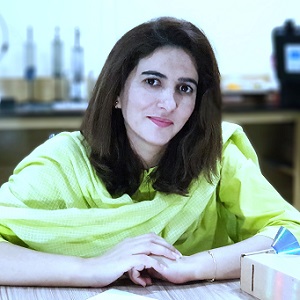Kiran Mujeeb - 2022 SPIE Women in Optics Planner
PhD Candidate
Department of Electronics, Quaid-i-Azam University
Pakistan
SPIE Student Member
 |
Born in Pakistan |
I was born in a small town near the “line of control,” the effective border between Indian Administered Kashmir and Azad Jammu and Kashmir. I grew up in fear of bombs and to the noise of shelling across the border. My mother left the comfort of a big city in Lahore to teach in that remote area. She was the first female teacher deployed to this area with no physical school yet. She wanted to educate every child in the community. However, poor infrastructure was a big hurdle in her mission. She founded three schools in Nakyal Fatehpur Thakyala, one of which has been promoted to a girls’ degree college now. In those days, carrying water pots on my head, travelling on uneven hilly tracks, I heard that “technology can bring comfort in our lives.” Those words stuck in my mind. My mother dedicated her life to the betterment of her community and died of brain cancer. As a young girl I decided to go into science and engineering to bring comfort to others, like she did.
Now I am pursuing a PhD in nano-optics. I design efficient plasmon sensors in collaboration with Lahore University of Management Sciences and Pennsylvania State University. I volunteer my time to outreach activities in optics and STEM. I also work as an affiliate expert on a project titled “Development of low-cost classroom demonstrations in optics” at Harmony Technologies.
The only college offering a BSc in my town was a “men’s college” and female students were not allowed to attend. Due to financial constraints, I was unable to go to school in another city. I started a campaign to get permission to study in at the local college. My father supported me, and we met with local authorities. Fortunately, they were convinced, and special, legal permission was granted. But the next challenge was social permission, because in a very conservative society, a girl cannot be allowed to study with boys at BSc level. Even though my family supported me, my prospective teachers did not. After so many “ifs” and “buts,” I was given the opportunity with a condition to convince more girls to join the class. I took on that challenge and worked in the community to convince their families.
I am grateful to all those girls and their families and others who supported me in this cause. In the end, it was not just my chance for higher education, but people found a new way to treat girls in our community.
I do I wish someone had advised me to pursue my education in the USA. Now I am lucky to work under the supervision of SPIE Fellow Dr. Akhlesh Lakhtakia at Penn State.
My advice to all girls and women considering a career in STEM is to join the professional bodies, like SPIE, at early stages and participate in their programs. It brings inspiration and opens doors to new opportunities.